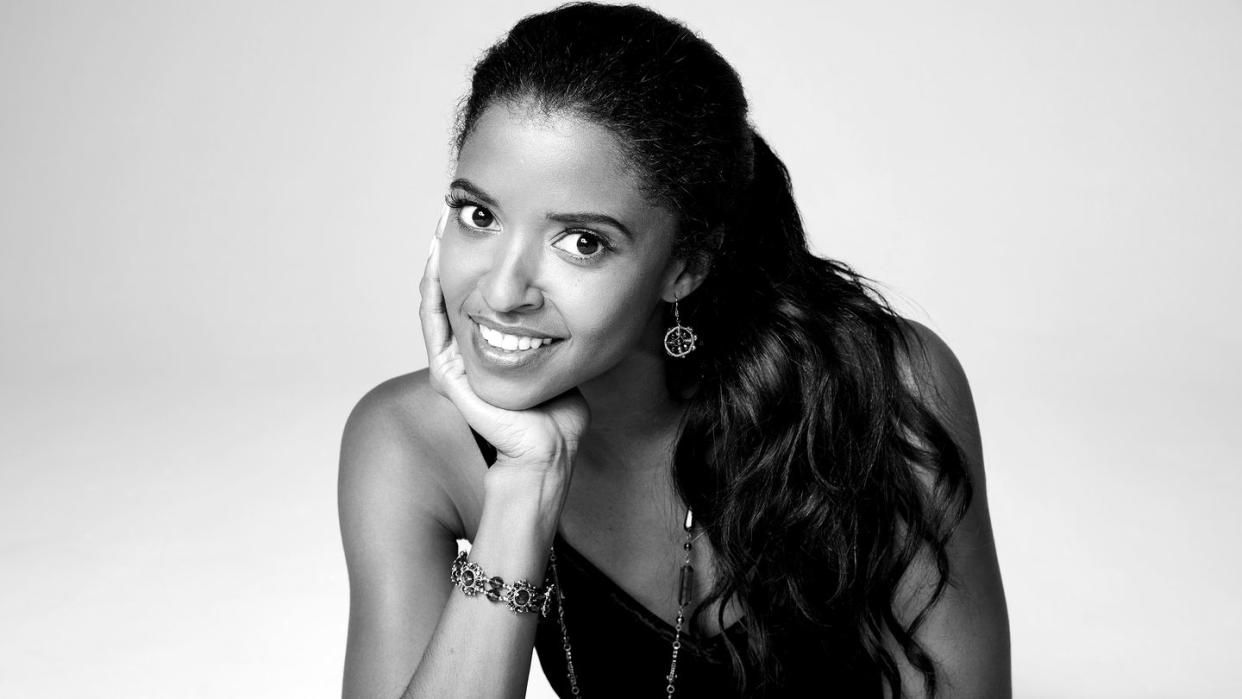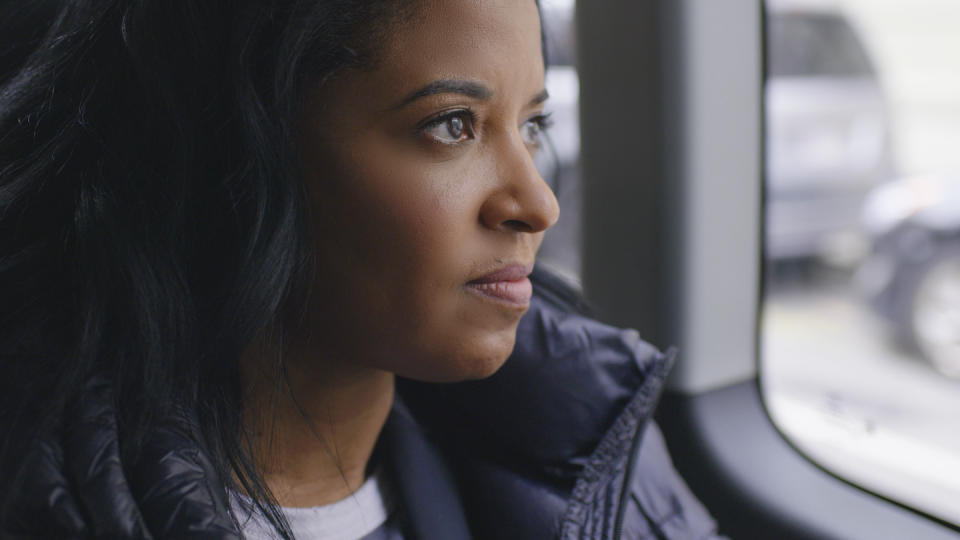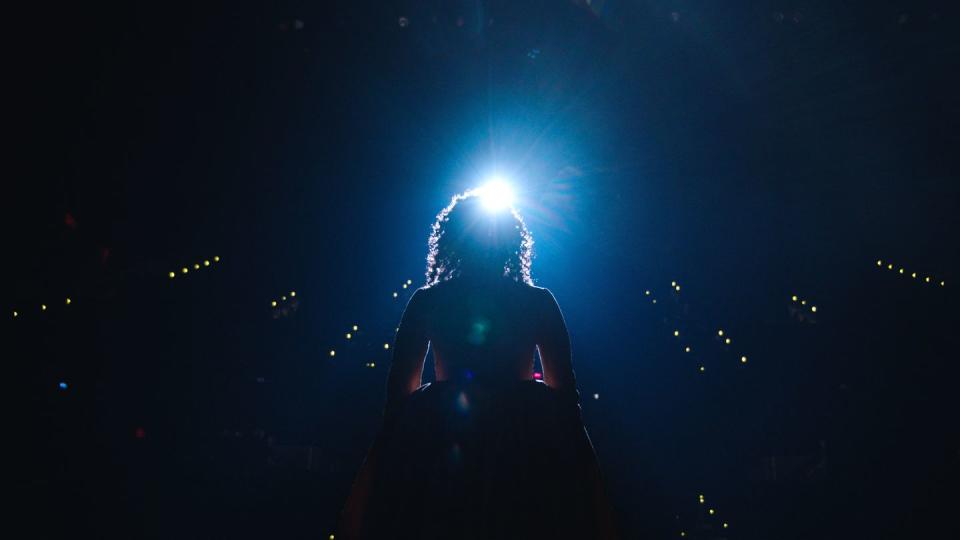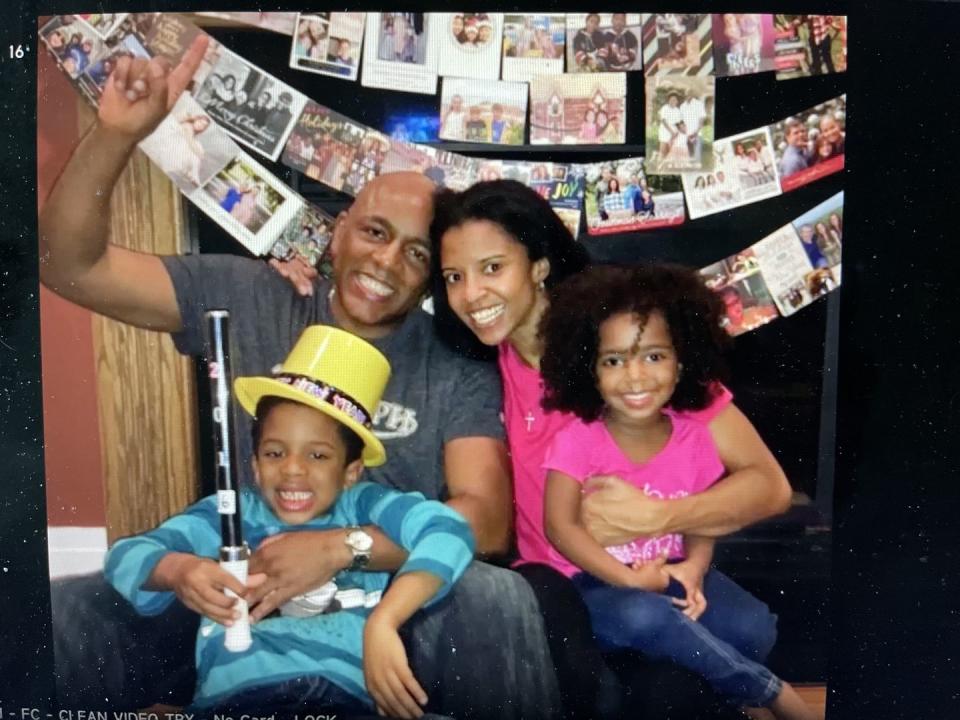Renée Elise Goldsberry’s Documentary “Satisfied” Is a Nuanced Look at Balancing Family and Fame

- Oops!Something went wrong.Please try again later.
Renée Elise Goldsberry was never planning to make a documentary about the three years she spent originating the role of Angelica Schuyler in Hamilton, for which she won her first Tony and Grammy awards.
At the height of the success of Lin-Manuel Miranda’s groundbreaking Broadway musical in 2015, Goldsberry was simply looking for a way to document the whirlwind experience of being part of a major theater production that had been thrust into the cultural zeitgeist. During her limited downtime before and after shows, rather than journaling, Goldsberry would prop up her phone and record herself musing about anything on her mind—the sinking feeling of flubbing a line onstage; the pressure to bring her A game to each performance, not knowing who could be in the audience; the surreal experience of being invited to perform at the White House; and the guilt she felt over not spending enough time with her two young children, Benjamin and Brielle.
Goldsberry never shared most of that footage. But as the COVID-19 pandemic brought life to a standstill in 2020, shortly before the Disney+ release of a film version of the original Broadway production of Hamilton, the actor and singer began digging through her phone for never-before-seen content, believing that it “might be the last time anybody cares about it.” While attempting to “figure out how to pull these videos out of the cloud” one evening, she noticed a through line: Every time she found a memento from Hamilton, she often also unearthed an invaluable familial memory.
“My phone does that thing where it combines events that were happening on the same day [in the Photos app], like, ‘This was the day you went to the White House. This was the day your son’s first tooth came out. Guess what? It’s in a movie together because it happened on the same day,’ ” Goldsberry tells Harper’s Bazaar in one of her first interviews about her new doc. “I wasn’t aware when I was in the experience that I was doing some incredible balancing act. I was just trying to be worthy of the gift.”
The next morning, she met up with one of her neighbors, acclaimed stage actor Kelli O’Hara, who had invited Goldsberry’s daughter to attend an outdoor tap dancing class for little girls on their filmmaking friend Chris Bolan’s front lawn. (Following Covid guidelines, the adults had placed makeshift squares of plywood six feet apart for the girls to dance on.) It was O’Hara who urged Goldsberry to turn her wealth of archival material into a larger film that would chronicle her life and career for the first time.
The result is Satisfied, a powerful new documentary that premiered last Saturday at the Tribeca Film Festival. Directed by Bolan and Melissa Haizlip and named after Goldsberry’s showstopping Hamilton number, Satisfied offers an intimate and unflinching look at Goldsberry’s struggles with infertility and her unwavering desire to start a family against the backdrop of her two-decade career.
“I feel a need to push against the idea that you would think I am just the credits and the successes that have happened in my life,” the actor says. “I think it’s important to give a more complete picture to the world than our biographies [might suggest]. I think it’s important, when you show up, to be as candid as possible.”

The film is anything but a vanity project for Goldsberry, who sees her story as part of a larger cultural conversation about the difficult (and seemingly never-ending) trade-off that most parents—but especially mothers—must make between pursuing their professional goals and living up to their children’s expectations at home.
“Hamilton has been extremely well documented in many ways, because fortunately, people were very interested in it. They loved the show; they loved the people that were in it and are in it,” Goldsberry says of the decision to center her documentary around the career-defining musical. “It’s just intriguing when something phenomenal happens. [People on the outside are] like, ‘How did that happen? How did it feel? What is it like?’ You just want more of it. There is [already] a documentary about Hamilton, so what’s important is if you’re going to do [another film about the making of that show], you have to share something not only new but valuable.”
Sure, an aspiring actor with a rare blend of talent and work ethic can use the success of many Broadway stars as a kind of road map for their own careers, in hopes of one day winning a Tony of their own. “But there are not as many examples of people having these kinds of miscarriages in very public ways sometimes, or [having] these very private, personal battles,” says Goldsberry, who reveals for the first time in Satisfied that she has suffered more than five miscarriages, and that she also lost a fetus while working on Hamilton. “[There are] not as many examples of how it feels to navigate that and keep moving forward, and I think it’s more valuable information to share.”
Goldsberry is not the only one who sees value in telling her story now. Some of the original company of Hamilton, including Miranda and Ariana DeBose, have lent their support by offering some of their own personal insights and mementos to enrich the documentary—which Goldsberry describes as still “humbling and mind-blowing,” considering the legacy of the show.
“Hamilton is something that is just so wonderful and so inexplicably great that I feel that they have to be very protective of it. When you have a platform that’s that big, you want to be responsible with it—and they’re incredibly responsible with it,” Goldsberry says. “It’s a huge gift for them to not only say okay, but they also opened up the doors: ‘Come on back into the theater, Renée. We have some content too, and we are not exactly sure what you’re doing with it, but we will take this leap with you because it feels like it’s important to you.’
“I’m just baffled by that kind of love and support,” she continues. “It’s also the reason why I was able to do [Hamilton] in the first place. I didn’t realize that I was doing this huge thing with young babies at home—but they must have, [because] they still picked me. I’m amazed that I got to have that experience, and I’m amazed that there is some time capsule that exists that I have been given license to share.”

In telling her own story, Goldberry says she was most concerned about protecting and not exploiting her children, who have already shared so much of their childhood—and their mother—with Hamilton. “Of course, I asked them for permission, like, ‘Hey, is it alright if I talk about this in this way?’ And they said yes, but is it even fair to ask [permission for that from] your kids? Whatever you ask, if it sounds fun in the moment, they don’t know the repercussions of it, so I was always questioning that choice,” she admits.
But when she first watched a cut of the documentary—which she did not produce, but she could have completely removed clips of her children from, if they no longer wanted to be a part of it—Goldsberry says the creative team made her realize that Satisfied “is actually for” her family.
“I realized, ‘Oh, this really is a beautiful way to give back a season of my life that exists because of the burden that they bore during that time,’ ” she explains. “My husband [Alexis Johnson], I think, is the star of this film, because you see him quietly in the back making dinner or, most importantly, just supporting me and talking about how he protected me from having it seem like a burden. They didn’t want the burden of it to be evident to me. You see my children support me from home [with] these constant messages of ‘We’re proud of you, Mommy,’ and you just realize, ‘Oh, the reason why she was able to have both of these things is because it’s not in spite of them—it’s because of them.’ I love that they also are aware that while I was gone, I was always mindful of what I was missing.”
Goldsberry’s children, who were not privy to many of her struggles with infertility and were too young at the time to now fully recall the cultural phenomenon that Hamilton became, have already seen the documentary. (Ben is now 15, and Brielle is 11.) Their joyful reaction, as well as their ability to recognize the sacrifices their parents made, “is what has given me incredible fuel to move forward with this,” Goldsberry says.
“I think some of the pain of being a mother that’s doing a lot of things that don’t involve your children is, it seemingly feels like [your kids] can’t take you for granted as being a supporting character in their own life in the way that I think they should,” she adds. “I feel like on some level, our moms are supporting characters in our life, and they’re sitting in the audience while we’re doing our piano recital or whatever; and [my kids] spend a little more time than other people’s kids in an audience watching me on stage. This puts them in the spotlight of my life in a way that I feel is actually healthy.”

Goldsberry, for her part, has had a similarly healthy relationship with the spotlight of fame. Although she was already an accomplished actor in her own right (her TV credits included The Good Wife and One Life to Live, and she had starred in Broadway productions of The Lion King, The Color Purple, and Rent), she had her first taste of major mainstream success with Hamilton in her mid-40s, which she now feels may have been a blessing in disguise.
In Hamilton, “I looked at all these kids in their 20s, and I was like, ‘Wow, how would I have blown [this kind of success] when I was in my 20s?’ ” she says with a self-deprecating laugh. “If it had happened to me younger, I would’ve probably believed it existed to set me up for further success in my life. I would probably think, ‘The value of this [project] in my life is to set me up for my albums, my movies, and my career. This is the launch into my career.
“And not that I don’t want to launch into some bigger career—let me not lie to you—but I think I am more focused on the way to use the platform as a ministry than I would have been if it had happened to me younger,” Goldsberry explains. “I think that sets up things like this [documentary], like, ‘Oh, I’ve had this life experience, and people might care to know what it was.’ ”
It’s the kind of invaluable wisdom that comes only with age and experience. Now, at 53, Goldsberry is taking a cue from Wickie Roy, the deliciously delusional diva she plays on hit sitcom Girls5eva, to continue to dream ambitiously in every facet of her day-to-day life. When asked if she is satisfied with the balance she has been able to strike between her personal and professional lives, Goldsberry responds, without missing a beat, “I am beyond satisfied.”
“I don’t know that there is a word that can capture how I feel, because it’s impossible to speak from a place of complete knowing. I don’t dare say that I have figured this out—I’m just in a different place on the journey—but what I feel is incredibly grateful,” Goldsberry says. “I feel that these kinds of conversations remind me to be a little bit more forgiving of myself and also realize that we don’t have to have all of the answers when we start to climb big mountains.”
She adds: “We wouldn’t exist as a species if we had all of the answers before we try to do these two huge things [working and parenting] at the same time. I think what’s universal is that it is a lie that it’s going to be neat. We just start it, and we believe that it’s going to work out. We have examples of people all around us who might not look like they’re completely together most of the time, but they are doing it—and it is worth it. … It’s a glorious battle. And this [documentary] is mine.”
You Might Also Like

